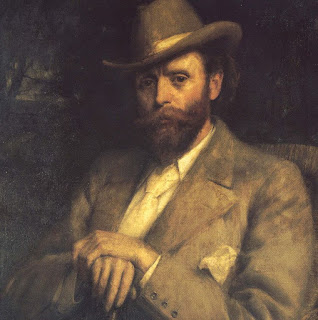“The Manxland Bard… a genuius … a powerful pen” (“Dundee Courrier, 25th December 1901)
 |
| Portrait of Hall Caine by R.E. Morrison |
Known later as Hall Caine, Thomas Henry Hall Caine was born on 14th May 1853 in Runcorn, Cheshire, UK. His parents were John Caine, from the Isle of Man, and his wife, Sarah, nee Hall (from Cumberland – now called Cumbria). Hall’s siblings were John (b. 1856), William Ralph (b.1865), who also became a writer, and Elizabeth Ann (1869-1914), who became a famous actress using the name Lilly Hall Caine. Caine is a Celtic name and Hall, his mother’s maiden name, is Norse.
Hall was educated at Hope Street School in Liverpool, where he was taught by George Gill, who was head of a school book publisher, and encouraged Hall’s talent for writing. Hall spent time with his Father’s family on the Isle of Man when he was growing up. Leaving school at the age of fifteen, Hall was apprenticed to an artichect and trained as an architectural draughtsman. He also contributed articles to local newspapers and magazines and gave lectures around Merseyside to various societies. The subject of one of those lectures - Dante Gabriel Rossetti - invited Hall to go to London. Hall lived with the old man right up until Rossetti died in 1882 and the two became great friends.
Under Rossetti’s influence Hall developed his literary talents and eventually became a novelist, playwright, short story writer, poet and critic. Hall worked for the “Academy” (a review of literature and general topics published in London from 1869 to 1902) and also contributed atricles to the “Athenaum” (a literary magazine published in London, from 1828 to 1921). His novel “The Eternal City” was the first novel to sell over a million copies worldwide. His plays were performed to wide acclaim both in America and Britain and Hall became very famous indeed.
In 1886, Hall married Mary Chandler and their sons were Gordon Ralph (1884 – 1962), who became a writer, publisher and Conservative politician and Derwent (b. 1891).
Hall became a resident of The Isle of Man in 1895 and sat from 1901 to 1908 in the Manx House of Keys, the lower house of Tynwald, the parliament of the Isle of Man (the other branch being the Legislative Council). He was elected President of the Manx National Reform League in 1903 and became Chairman of the Keys' Committee that prepared the 1907 petition for constitutional reform. In 1929, Hall was granted the Freedom of the Borough of Douglas, Isle of Man. He visited Russia in 1892 on behalf of the persecuted Jews and in 1895, travelled in north America and Canada, where he represented the Society of Authors.
During the First World War (1914 – 1919), he wrote many patriotic articles and edited “King Albert's Book”, the proceeds of which went to help Belgian refugees.
 |
| Cover of "King Albert's Book" |
In 1917, Hall was created an Officer of the Order of Leopold by King Albert I of Belgium. He cancelled his literary engagements in America in order to devote his time and energy to the British war effort. At the recommendation of then Prime Minister Lloyd George, King George V made him a Knight of the British Empire (KBE) in 1918, for services as an Allied propagandist in the United States. In 1922, Hall Caine was made a Companion of Honour (CH).
Hall died on 311st August 1931 on the Isle of Man.
Sources: Find my Past, Free BMD, “Hall Caine: The Man and the Novelist” by C. Fred Kenyon (Greening & Co. Ltd., London, 1901)
http://www.gutenberg.org/files/57564/57564-h/57564-h.htm
http://www.isle-of-man.com/manxnotebook/people/writers/thc.htm
https://shakespeare.emory.edu/lily-hall-caine/
https://en.wikipedia.org/wiki/Gordon_Hall_Caine
http://www.victorianweb.org/authors/caine/bio1.html
NOTE: Robert Edward Morrison (1851–1924) – artist
Born and educated in Peel, on the Isle of Man, UK, before moving to Douglas and then, in 1870, to Liverpool. President of Liverpool Manx Association. Died in Liverpool on 25 December 1924